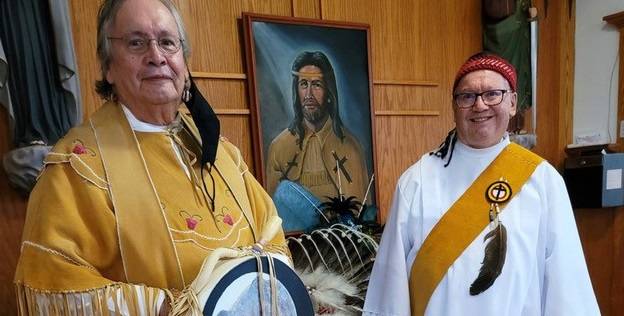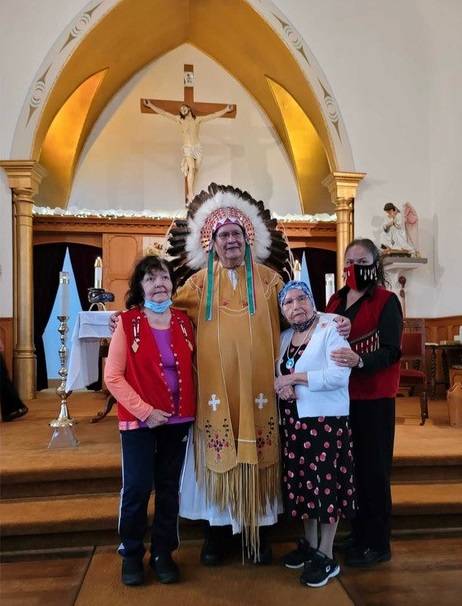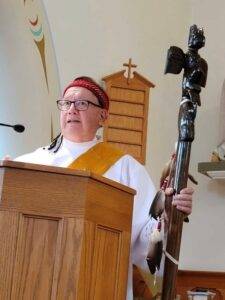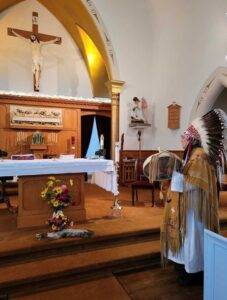Mass celebrated in Squamish language for first time
Pictured left: Father Garry LaBoucane (left) celebrated the Mass, assisted by Deacon Rennie Nahanee of the Squamish First Nation, at St. Paul’s Indian Catholic Church September 26. “I see this as reconciliation between the Church and our native people,” Deacon Nahanee said (Photos submitted)
It was a Mass that will make the history books, said Deacon Rennie Nahanee.
Mass was celebrated in the Squamish language for the first time at St. Paul’s Indian Catholic Church in North Vancouver Sept. 26, just days before Canada’s first National Day for Truth and Reconciliation.
“I see this as reconciliation between the Church and our native people,” Deacon Nahanee, a member of the Squamish First Nation, told The B.C. Catholic.
“I believe this will build our language up.”
In many cases Indigenous children sent to residential schools were strictly forbidden to speak their languages of origin under pain of physical punishment, said Deacon Nahanee. That led to many of their languages going silent, underground, or dormant.
Thanks to the Truth and Reconciliation Commission’s Calls to Action, Indigenous languages are enjoying more support and experiencing something of a revival, he said. To have the Squamish language embraced and spoken at Mass takes it to new heights.
“We have language teachers, and they are teaching social and descriptive speaking about places, events, and people, but when you talk the language of the Church, it’s a whole different level.”
Father Garry Laboucane, an Oblate priest with a First Nations heritage, celebrated the Mass wearing a feathered war bonnet (a symbol of leadership) and vestments made of buckskin.
Deacon Nahanee said the pews at St. Paul’s were full. Many non-Indigenous people attending were “full of respect” and eager to learn some new words, quickly catching on that “halth kwisti mas” means “Amen.”
Deacon Nahanee said a woman approached him afterward and said it was the most profound Mass she’d experienced in 17 years.
“She found the spirituality and the songs and the atmosphere very calming, very different from other churches. There seemed to be an ‘aliveness’ there,” he said. “I think that was the best description.”
The entire Mass could not be offered in Squamish, since an approved translation doesn’t exist. So while the songs and many prayers were done in the Squamish language, the readings were in English. Deacon Nahanee said it would take many years to translate the readings and prayers, such as the words of consecration, appropriately.
He said certain words are particularly difficult to translate. For example, there isn’t a Squamish word that accurately portrays “church” as a building and as the body of Christ. “We’re going to be improving and growing as we go along.”
Still, he sees the Mass as a strong step that the Squamish people and Catholics can take together toward full reconciliation. Plans are in the works to continue celebrating Mass in the Squamish language on the fourth Sunday of every month. The next will be Oct. 24.
Archbishop J. Michael Miller, CSB, is supportive. “The recent use of the Squamish language and traditions at St. Paul’s Church is a sign, I believe, of the archdiocese’s commitment to healing and reconciliation with Indigenous peoples,” he told the B.C. Catholic.
He expressed his gratitude to Deacon Nahanee, Father Laboucane, and St. Paul’s pastor Father Tap Kurudeepan for their work in making this historic Mass happen.
“Every culture brings its own gifts to the celebration of Mass, and I am very pleased that our Catholicity has been so enriched.”
Canada’s first National Day for Truth and Reconciliation was Sept. 30.
By Agnieszka Ruck
Published on The B.C. Catholic website





